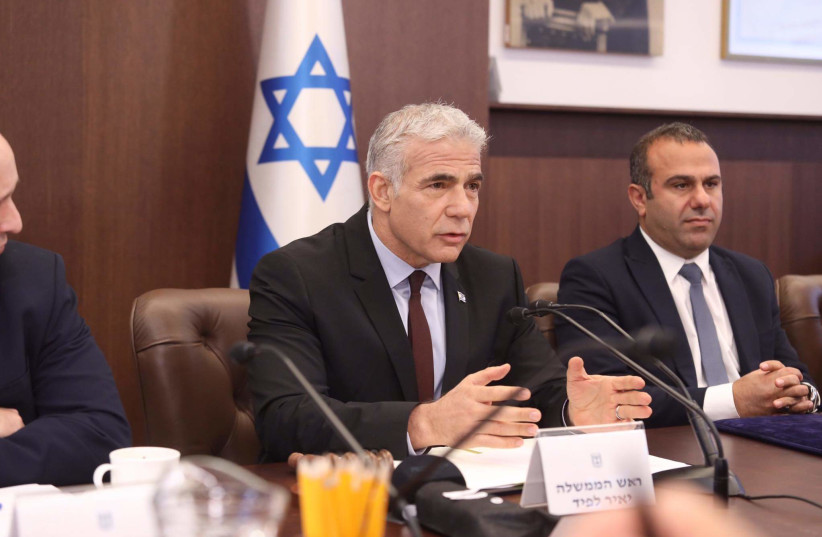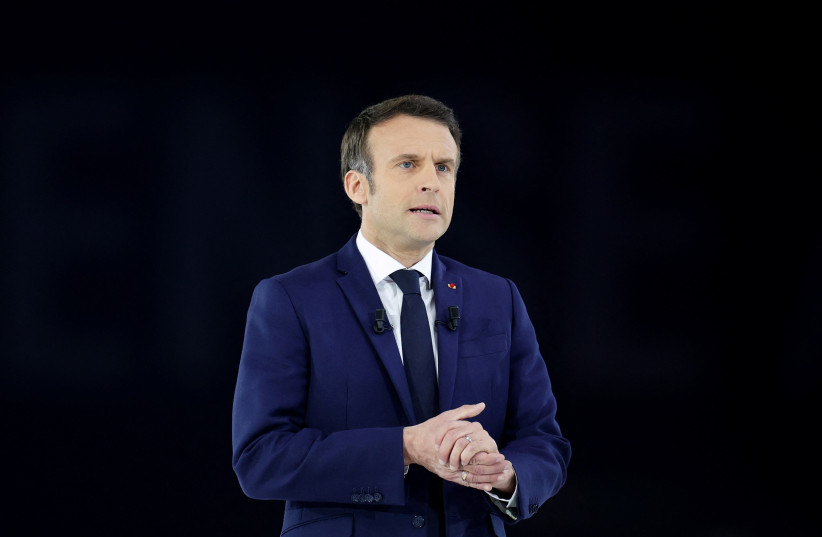 Lapid to tell Macron: Hezbollah should not play with fire
Lapid to tell Macron: Hezbollah should not play with fire
LAHAV HARKOV

Prime Minister Yair Lapid plans to ask French President Emmanuel Macron to relay to Lebanon that Israel will not negotiate its maritime border while under threat from Hezbollah.
Lapid’s first trip abroad as prime minister will be to Paris on Tuesday, where he is expected to meet with Macron and French Prime Minister Élisabeth Borne and return to Israel later that day.
The trip, originally planned for former prime minister Naftali Bennett, is set to take place days after the IAF shot down three unmanned aircraft launched by Hezbollah toward Israel’s Karish gas rig in the Mediterranean Sea.“Hezbollah should not play with fire,” a senior diplomatic source said Monday.
“We want to complete negotiations on the maritime border, but we will not do it under threat from Hezbollah.”
Prime Minister Yair Lapid
Lapid plans to ask Macron to use his connections and influence in Lebanon to relay the message: “We want to complete negotiations on the maritime border, but we will not do it under threat from Hezbollah.”

He also plans to present new materials showing how Hezbollah, which in addition to being an Iran-backed terrorist group is a party in the Lebanese government, is endangering Lebanon and its security.
“Lebanon should take advantage of this time,” the diplomatic source said. “There are good conditions to reach an agreement on the maritime border with an active US envoy. The Israeli and Lebanese official stances are known and will allow us to reach an agreement. The lines Lebanon submitted to the UN are reasonable even if there are disagreements on the details.”
Maritime border dispute
Israel and Lebanon have a long-standing dispute on the demarcation of their maritime border in the Mediterranean Sea, which has been subject to on-and-off US-mediated negotiations since October 2020, including a visit to the region by US Special Envoy and Coordinator for International Energy Affairs Amos Hochstein in recent weeks.
The dispute between Lebanon and Israel, which began over a decade ago, involves an 860-sq.km. triangle in the Mediterranean Sea. Talks broke down in 2021 when Lebanon sharply increased its demands after four rounds of US-mediated talks, almost tripling the disputed area to 2,300 sq.km. to include the northern end of the Karish natural-gas field.
In June, Energean hooked up a production ship to the Karish gas field in Israeli waters about 80 km. west of Haifa, and it planned to start delivering gas from the reservoir later this year.
Lebanese President Michel Aoun said the vessel had entered “the disputed maritime area with Israel” and threatened that Beirut would view the gas extraction as “a provocation and an aggressive action.”
“We want to ensure that the French tell the Lebanese to act so Hezbollah doesn’t stand in the way of an agreement,” the senior diplomatic source said.
The Iranian nuclear threat is also expected to be a major topic of discussion between Lapid and Macron, following France’s role in the International Atomic Energy Agency Board of Governor’s statement calling for greater transparency from Iran, as well as discussions of Tehran’s nuclear program at recent meetings of the G7 and the UN Security Council.
“The prime minister will present the same stance as his predecessor,” the diplomatic source said. “Israel’s policy is that a return to the JCPOA [2015 nuclear deal] is a mistake because the sunset clauses are near. At the same time, we do not oppose any agreement; we want a long and strong deal in the future.”
Israel hopes to work with its partners on an international campaign against Iran with diplomatic and economic elements, the source said, adding that Lapid will try to gain an understanding of what France, specifically, and the E3 – the three European countries involved in Iran talks, the UK, Germany and France – are willing to do on that front.Other matters on Lapid’s agenda for the Paris trip include the energy crisis, the war in Ukraine and economic and security bilateral relations between Israel and France.
Zawartość publikowanych artykułów i materiałów nie reprezentuje poglądów ani opinii Reunion’68,
ani też webmastera Blogu Reunion’68, chyba ze jest to wyraźnie zaznaczone.
Twoje uwagi, linki, własne artykuły lub wiadomości prześlij na adres:
webmaster@reunion68.com
